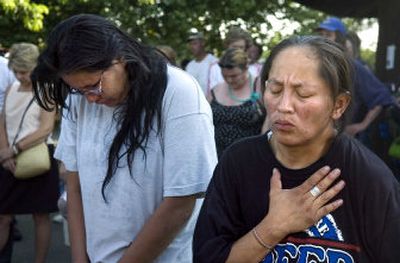‘One Leg Doug’ remembered

Doug Dawson’s death was much like his life: painful.
His life was riddled with heartbreak and scarred by a battle with alcoholism that rendered him useless in the working world.
It ended Monday, when the homeless amputee died from the injuries he suffered from being set afire while he slept in his wheelchair last week. “I’m mourning a lost soul,” said his cousin, Mary Lou Hummel, of Missoula. “He was a wanderer who drifted in and out of his family’s life.”
Dawson suffered severe burns to his hands, thighs, groin area and the back of his leg last Friday as he slept behind a building at 151 S. Washington St.
Sean Knold, 23, of Seattle, and Matt Tramell, 22, of Portland, were arrested in connection with a robbery nearby and could face murder charges in connection with setting the 50-year-old Dawson ablaze.
Knold and Trammell both refused jailhouse interviews on Tuesday, but Trammell previously told KXLY the two men didn’t do it.
Fire officials are still investigating, said Assistant Chief Brian Schaeffer, of the Spokane Fire Department. .
Members of the homeless community banded together Tuesday to mourn the loss of their friend.
“Why’d them kids do that to him?” asked a teary-eyed Shirley Cunningham, a homeless woman who first met Dawson at People’s Park in 1979.
Dawson, who was often called “One Leg Doug,” was born in Spokane, family members said. His mother and father split up when he was about 6 weeks old, and from that point on “Doug didn’t have a happy life,” Hummel said.
He had three sisters, two of whom died in accidents in which drinking was involved, said Richard Dawson, an uncle. Dawson’s father, Melvin, died of alcohol-related health problems about five years ago, he said.
Dawson lost a leg in an alcohol-related accident in his early 20s, his uncle said.
He told friends in the homeless community he lost the leg while serving in Vietnam, said Ed McCarron, director of the House of Charity. According to his family, Dawson never served in the military.
He had been homeless and out of work since he was about 23 years old, about the time he lost his leg, friends and family said.
Loreen McFaul, development director for House of Charity, said Dawson had been a frequent client, but he didn’t always follow the “no alcohol” rule and at times was temporarily banned.
“His family wanted to help, but Doug didn’t want to give up what ailed him – alcohol,” McCarron said.
Dawson’s friends described him as “friendly, funny and loud.”
“Doug would share anything with you,” said Walter Denny, who knew Dawson for about three years.
When Cunningham was asked to describe some of Dawson’s favorite things, she quickly rattled off “whiskey, marijuana and girls.”
But Cunningham couldn’t say where Dawson was born, how he lost his leg or who his family members were, despite knowing him for 27 years.
“We don’t get into each other’s personal lives,” said a homeless man who wished to remain anonymous. “It’s more about having a good time together and not thinking about that stuff.”
Members of a congressional Democratic campaign, who helped Dawson in his last days, held a dinner in Dawson’s honor Tuesday night at Riverfront Park. The memorial included a moment of silence and a free meal, including hot dogs and salad. Quaker clergyman Nick Block said a prayer and mentioned that Dawson was homeless, handicapped and vulnerable. But Block noted that the two men accused of killing Dawson also were homeless.
About 60 people milled around. Among them was Dawson’s great uncle, Larry Lantis, of Spokane. He recalled that years ago Dawson had a prosthesis, which he would occasionally use to strike people when he got drunk.
Somewhere along the way, the prosthesis disappeared. Lantis said Dawson didn’t miss it; he could get around better on crutches or in a wheelchair.
Of his great nephew, Lantis summed up: “When he was sober, there wasn’t a nicer guy in a pair of shoes.”